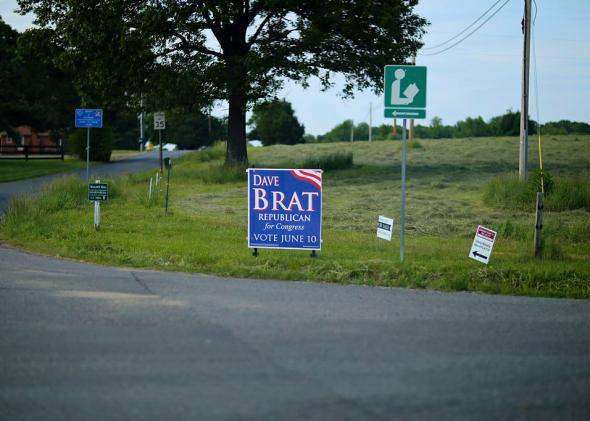David Brat, the obscure college professor and Tea Party favorite who unseated House Majority Leader Eric Cantor in last night’s giant election shocker, thinks mainstream economics is a bit of a lie. This might seem odd, given that the man is himself an economist at Randolph-Macon College. But in 2005, he produced a long, apparently unpublished reader on the history and philosophy of economic thought (which Vox turned up last night). It argues, essentially, that the field suffers from a mass delusion of scientific impartiality.
And it’s a pretty good read, if you’re into dense philosophy talk. Brat earned a master’s degree in divinity from Princeton Theological Seminary; like many students of religion, he’s deeply interested in epistemology—the study of how we know what we know that underpins so much of philosophy and ethics. Economists, Brat argues, are essentially kidding themselves (or at least the public) about the soundness of the field’s epistemological foundations. Where most practitioners will tell you that they try to derive truths about the world by working from data and empirical observations, like natural scientists, Brat says their methods are actually grounded in unexamined moral and philosophical assumptions—especially utilitarianism, which generally holds that our goal should be to do the greatest amount of good for the greatest amount of people.
Here’s a nice summary, from the start of the reader:
While I will try not to preach any particular ethics, I do have an agenda. This agenda is to illustrate, by the internal logic of economics alone, that the dominant methodology in economics is in serious question, if not dead. However, I and the people who have helped me to write this book, view these problems within the context of a much longer history than do most economists. Western Philosophy has been around for 3000+ years. Western Theology is nearly the same age. These are the old dogs on the block. By comparison, the field of Economics is a very very young puppy. So while many economists are very nervous about the methodological problems in their field, the theologian and philosopher are very used to seeing their fields collapse every few hundred years. Perhaps this knowledge and wisdom can be brought to bear on the economic transformation which is under way.
Of course, it’s easy to find people who argue that economics isn’t really a science. What’s interesting is that it’s not clear whether Brat thinks science is even “science.” He devotes a good deal of the reader to the collapse of philosophical “positivism,” which, again, is the idea that we can only draw knowledge from observed experience.
The Tea Party’s new favorite face isn’t arguing that economics should be less concerned with ethics. He just seems to think we should be more open to alternative points of moral departure. He appears to be big on the work of Deirdre McCloskey, who believes that economics should be framed as a form of “rhetoric”—which is to say, just part of the ancient art of persuasion.
The thing is, most people—even if they don’t think consciously about it—are pretty utilitarian about their outlook. They’ll tell you they want an economy that makes everyone as rich as possible. Brat, as Vox notes, is an advocate for the work of Ayn Rand, with her emphasis on freedom and individual greatness. He’s even the director of a program funded by BB&T devoted to spreading her gospel. (Which, as always, is a little funny for a devoted Christian, since Rand’s work is very much wrapped up in her atheism. But I digress.)
In any event, there will probably be lots of talk about how Brat is an economist. It’s important to know that he approaches the discipline a little differently than most.
